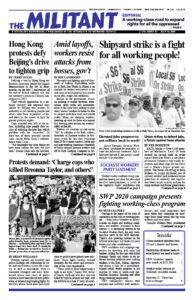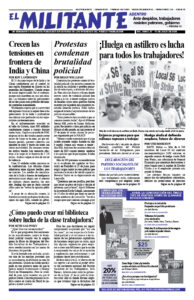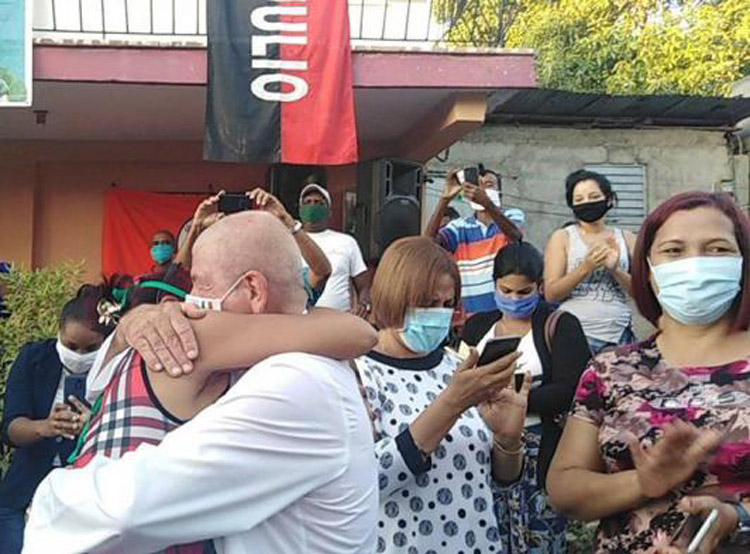Revolutionary Cuba has sent more than 2,000 doctors and other health care workers to 30 countries over the last few months in response to governments’ requests for help in treating patients during the COVID-19 worldwide outbreak.
The Cuban volunteers have treated some 110,000 patients, saving lives and slowing the spread of the disease. The COVID-19 missions come on top of the more than 28,000 health workers who were already volunteering in 59 countries.
Worried that these internationalist medical missions are bolstering the prestige of the Cuban Revolution, Washington is stepping up its slander campaign.
In June the State Department released its annual “Trafficking in Persons Report,” which rates nations on their alleged violations. In fact, the ratings reflect how the U.S. rulers rate government’s subservience to Washington’s imperialist objectives. This year’s “ratings” are full of lies that the Cuban health workers are victims of “forced labor.”
The State Department claims that the medical missions bring in some $7 billion as a “for-profit activity of the Cuban regime” and tries to make that sound insidious.
Whatever money Cuba gets for the aid — and some governments pay little or nothing — goes to keep the program going. In addition it helps to pay for the country’s health system, which provides medical care free of charge for everyone on the island, and to cover other programs that involve and benefit workers and farmers. Health care in Cuba is a social right for everyone.
Committed to international solidarity
Cuban medical workers volunteer as an expression of their commitment to international working-class solidarity. “I didn’t hesitate for a minute,” intensive care nurse Eduardo Brito Pérez told Granma, recalling when he was asked to join the mission to Lombardy, Italy.
Brito said he doesn’t agree with those who call him and other volunteers heroes. “A man should be where he is most useful, where duty calls him,” he said. “I am proud to say that I returned to my country with my mission accomplished.”
U.S. Assistant Secretary of State for Cuba and Venezuela Carrie Filipetti charged in December that the medical volunteers are “sowing political and social discord throughout the world.” She alleged that Cuban doctors in Venezuela threatened to withhold treatment from anyone who didn’t support Venezuelan President Nicolás Maduro.
But the Cubans don’t provide aid based on the politics of the requesting government. They went to serve in imperialist Italy. They are in Martinique, a French colony, and serve in two British “overseas territories,” Anguilla and the Turks and Caicos Islands. The Cuban volunteers scrupulously respect the sovereignty of the nations they aid.
Cuba offered to send 1,600 medical volunteers, field hospitals and 83 tons of medical supplies to New Orleans one day after Hurricane Katrina devastated neighborhoods there in 2005 — a request that was rejected out of hand by Washington.
On June 17, Sens. Rick Scott, Ted Cruz and Marco Rubio introduced a “Cut Profits to the Cuban Regime Act.” Ronald Sanders, the ambassador of Antigua and Barbuda to the United States, responded the next day. He said the three senators “disregard the sovereign right of other countries to enter arrangements with Cuba.”
The Cuban internationalists who are currently treating COVID-19 patients in 15 Caribbean countries have “made a huge and beneficial difference,” Sanders said. Without them, “the medical system of several Caribbean countries would have collapsed.”
Internationalism has always been a hallmark of the Cuban Revolution, which overthrew the U.S.-backed Batista dictatorship in 1959. In the first few years of the revolution the Cuban government aided the National Liberation Front of Algeria, which was fighting for independence from French colonial rule. After independence was won it sent 57 doctors and other health care workers.
Like all Cuban internationalist missions — contrary to the lies of the State Department — health workers went to Algeria as volunteers. “Nobody was pressured or required to participate,” Pablo Resik Habid, who headed up the first medical brigade to Algeria in 1963, told Cuban journalist Hedelberto López Blanch.
Cuba’s medical situation was challenging for the young revolution, Resik said, because half of the island’s 6,000 doctors emigrated to the United States after 1959. At the same time, Washington was organizing economic warfare and military aggression against the new workers and farmers government.
Revolutionary morality
Sending doctors to Algeria “was like a beggar offering his help,” said 89-year-old José Ramón Machado Ventura, who joined the revolutionary war against Batista as a doctor. He helped establish the mission, and remains a leading member of Cuba’s revolutionary government today. “But we knew the Algerian people needed it even more than we did and that they deserved it.”
This is proletarian morality — the opposite of the dog-eat-dog morality of capitalism. It’s possible only because Cuba’s workers and farmers took power out of the hands of the landlords and transformed themselves in the process. They are determined to continue to defend their revolution, as they are doing today against Washington’s slanders.
The U.S. rulers fear that if more working people elsewhere learn the truth about Cuba’s revolution, they will want to emulate its example.


